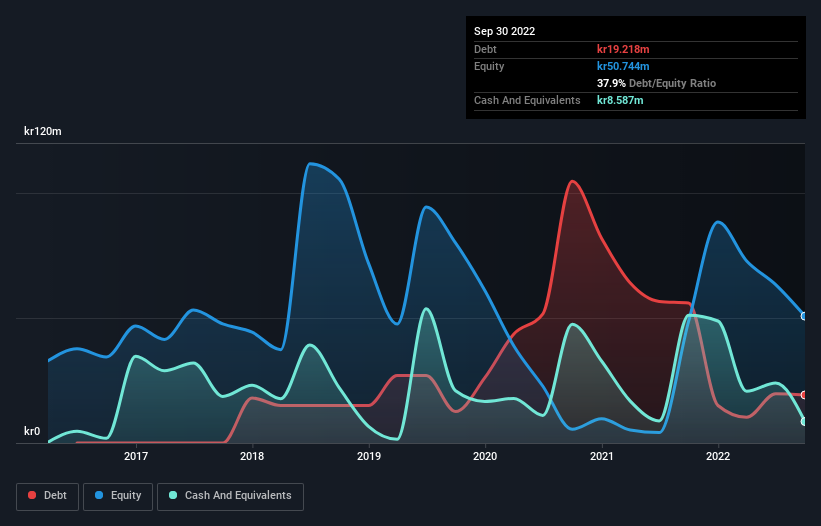
The external fund manager backed by Berkshire Hathaway's Charlie Munger, Li Lu, makes no bones about it when he says 'The biggest investment risk is not the volatility of prices, but whether you will suffer a permanent loss of capital.' It's only natural to consider a company's balance sheet when you examine how risky it is, since debt is often involved when a business collapses. As with many other companies Cortus Energy AB (publ) (STO:CE) makes use of debt. But should shareholders be worried about its use of debt?
Why Does Debt Bring Risk?
Generally speaking, debt only becomes a real problem when a company can't easily pay it off, either by raising capital or with its own cash flow. In the worst case scenario, a company can go bankrupt if it cannot pay its creditors. However, a more common (but still painful) scenario is that it has to raise new equity capital at a low price, thus permanently diluting shareholders. Of course, the upside of debt is that it often represents cheap capital, especially when it replaces dilution in a company with the ability to reinvest at high rates of return. The first step when considering a company's debt levels is to consider its cash and debt together.
Check out our latest analysis for Cortus Energy
What Is Cortus Energy's Debt?
You can click the graphic below for the historical numbers, but it shows that Cortus Energy had kr19.2m of debt in September 2022, down from kr56.0m, one year before. On the flip side, it has kr8.59m in cash leading to net debt of about kr10.6m.

How Strong Is Cortus Energy's Balance Sheet?
We can see from the most recent balance sheet that Cortus Energy had liabilities of kr40.9m falling due within a year, and liabilities of kr7.14m due beyond that. On the other hand, it had cash of kr8.59m and kr4.75m worth of receivables due within a year. So its liabilities total kr34.7m more than the combination of its cash and short-term receivables.
Since publicly traded Cortus Energy shares are worth a total of kr299.6m, it seems unlikely that this level of liabilities would be a major threat. However, we do think it is worth keeping an eye on its balance sheet strength, as it may change over time. There's no doubt that we learn most about debt from the balance sheet. But it is Cortus Energy's earnings that will influence how the balance sheet holds up in the future. So when considering debt, it's definitely worth looking at the earnings trend. Click here for an interactive snapshot.
In the last year Cortus Energy wasn't profitable at an EBIT level, but managed to grow its revenue by 10,782%, to kr6.2m. That's virtually the hole-in-one of revenue growth!
Caveat Emptor
While we can certainly appreciate Cortus Energy's revenue growth, its earnings before interest and tax (EBIT) loss is not ideal. Its EBIT loss was a whopping kr61m. When we look at that and recall the liabilities on its balance sheet, relative to cash, it seems unwise to us for the company to have any debt. Quite frankly we think the balance sheet is far from match-fit, although it could be improved with time. However, it doesn't help that it burned through kr61m of cash over the last year. So suffice it to say we consider the stock very risky. The balance sheet is clearly the area to focus on when you are analysing debt. But ultimately, every company can contain risks that exist outside of the balance sheet. For instance, we've identified 5 warning signs for Cortus Energy (3 are concerning) you should be aware of.
At the end of the day, it's often better to focus on companies that are free from net debt. You can access our special list of such companies (all with a track record of profit growth). It's free.
New: AI Stock Screener & Alerts
Our new AI Stock Screener scans the market every day to uncover opportunities.
• Dividend Powerhouses (3%+ Yield)
• Undervalued Small Caps with Insider Buying
• High growth Tech and AI Companies
Or build your own from over 50 metrics.
Have feedback on this article? Concerned about the content? Get in touch with us directly. Alternatively, email editorial-team (at) simplywallst.com.
This article by Simply Wall St is general in nature. We provide commentary based on historical data and analyst forecasts only using an unbiased methodology and our articles are not intended to be financial advice. It does not constitute a recommendation to buy or sell any stock, and does not take account of your objectives, or your financial situation. We aim to bring you long-term focused analysis driven by fundamental data. Note that our analysis may not factor in the latest price-sensitive company announcements or qualitative material. Simply Wall St has no position in any stocks mentioned.
About OM:CE
Medium-low and overvalued.
Market Insights
Community Narratives



